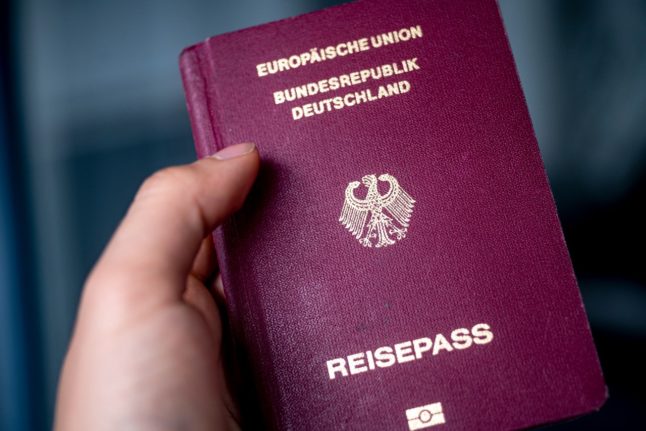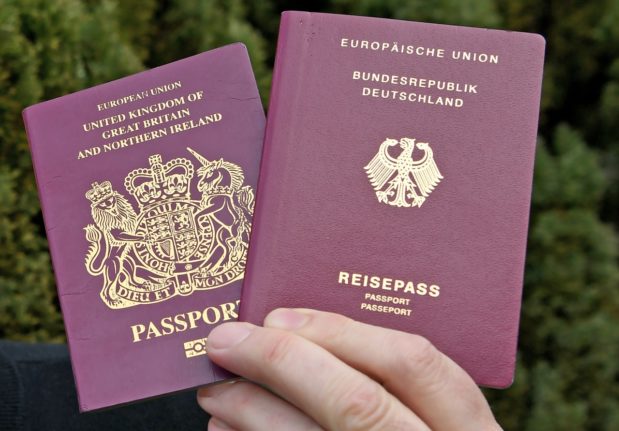Germany’s coalition government will soon be putting its proposed changes to citizenship law before the German parliament.
As The Local has been reporting, the draft bill aims to make naturalisation easier by allowing dual citizenship, cutting the required period of residence from eight to five years and enabling high achievers to become German after just three years.
READ ALSO: UPDATED: The key points of Germany’s draft law on dual citizenship
But as the government works on finishing off the draft, opponents of the proposed relaxed citizenship law are gearing up to put forward their proposed changes.
A secure livelihood
The current draft of the bill states that applicants for German citizenship should be able to secure their own livelihood without the need for support from state benefits such as Bürgergeld or housing benefits.
However, in the opinion of some politicians, this is too lenient.
Federal Justice Minister Marco Buschmann (FDP) told Welt am Sonntag: “The requirement must be clear: To acquire German citizenship, someone must be able to live permanently from their own gainful employment.”
In a joint paper, Free Democrat (FDP) politicians Stephan Thomae and Konstantin Kuhle demanded that naturalisation should only be granted to “those who can earn their own living and provide for their family.” Any exceptions to this rule, they say, should be scrapped.
READ ALSO: Reader question: Can I still get German citizenship after claiming benefits?
The current citizenship law allows someone to be naturalised even if they are not able to support themselves and their dependents, “for reasons of public interest or to avoid particular hardship” and the draft law plans to keep this exception.
The CDU/CSU in the Bundestag has also come up with a concrete proposal to ensure that only those in gainful employment can apply for German citizenship.
Parliamentary group vice president Andrea Lindholz (CSU) said that this should be expressed even more clearly in the citizenship law. “The law should include the prerequisites that naturalisation will in principle only be possible in the future if the foreigner has been continuously employed for the previous 24 months and an adequate old-age pension can be expected at the time of naturalization,” she said.

“We do not want immigration into the social systems. A prerequisite for naturalisation must therefore also be a certain degree of economic integration,” she added.
In defence of the draft bill, Hakan Demir, SPD expert on citizenship law, told WELT: “Already now, securing a livelihood is a prerequisite for naturalisation.” Justified exceptions for people who are not responsible for receiving social benefits themselves are “pragmatic and allow the authorities to do justice to the situation in individual cases,” he said.
READ ALSO: INTERVIEW: Germany on track to pass dual citizenship despite opposition
According to Demir, the exceptions apply, for example, to people who become unemployed as a result of their employer’s insolvency, who are caring for relatives in need of care, or who cannot fully cover their living expenses because of education.
“None of these cases should result in people, who after all must otherwise have fulfilled all other requirements, being prevented from naturalization.”
Adherence to the basic law
According to the current draft law, naturalisation is out of the question if the foreigner “shows by his or her behaviour that he or she does not accept the equal rights of men and women laid down in the Basic Law”.
These can include “anti-Semitic, racist, xenophobic or other inhumanely motivated actions incompatible with the human dignity guarantee of the Basic Law”.
But, according to a recent report in BILD, the FDP is urging that this requirement be sharpened up and it wants anti-Semitism to become an exclusion criterion for naturalisations.
READ ALSO: German conservatives criticise dual citizenship plans for promoting ‘loyalty conflicts’
For this, they suggest an anti-Semitism test be carried out before naturalisation and that there should be a detailed examination of whether applicants have ever taken part in anti-Semitic demonstrations or are members of an anti-constitutional organisation.
FDP Secretary-General Bijan Djir-Sarai said: “Anyone who does not accept our values cannot be naturalised.” A “genuine declaration of loyalty to the Basic Law” is extremely important, he said.
The FDP is also proposing citizenship applicants take an oath to confirm allegiance to the principles of the basic law.



 Please whitelist us to continue reading.
Please whitelist us to continue reading.
Really? Foreigners need to prove they aren’t Xenophobic before they are allowed to become Germans? What about the massive numbers of Xenophobic Germans? Hypocrisy, much?